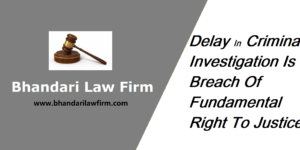SUSPENSION OF IBC: IS IT BANE OR BOON FOR MSME
INTRODUCTION: IBC was introduced in 2016 to provide a time-bound process to resolve the issue of insolvency and the piling of the NPA cases. The President on June 5, 2020, promulgated an ordinance added Section 10A in the Code which says that all the application filed on 25 march or after under Sections 7, 9, and 10 of IBC will be suspended for a period of 6 months which can be further extended to 1 year. This step was taken in furtherance of the Atmanirbhar package to relieve companies who are on the brink of insolvency because of the financial instability in the country due to COVID. However, this approach of Government will have a pernicious effect on the various sector especially MSME SUSPENSION IBC BANE BOON MSME
NEED OF THE ORDINANCE
The lockdown period from March 2020 had been exceptionally troublesome for the various sector of the country especially for the MSME sector due to the complete disruption of all the activities. The impact of which will be seen indeed after the restrictions are invoked by the Government. In this disruption period, the MSME sector has been hit very hard due to which they need to be protected. This is the reason why bringing an ordinance becomes a need of the hour. Besides the suspension of proceedings under IBC, the ordinance enunciates that the limit of default for MSME shall be increased from 1 Lakh to 1 Crore for the particular time period in consonance with Section 240A (2) which shall be in the interest of the public. RBI had also imposed a moratorium of 3 months on the recovery of loans by the financial creditors as the situation demands.
As we know that this COVID situation has brought the country’s economy to a standstill due to which various companies, financial institutions, and businesses have been impacted across the world. This incidence has created a lot of precariousness and pressure for business and due to this pressure, companies are endangered to get liquated. Usually, the companies derive their funds from the sponsors or investors but who will invest in the company against whom the successful CIRP proceedings have been initiated.
Read Also: What is Insolvency and Bankruptcy Code 2016
Suspending the proceeding under the Insolvency and Bankruptcy Code will give some time to the companies to restructure and revive their company and avail the benefit of the Atmanirbhar Bharat package. This ordinance will bring stability to the businesses and will give them time to save themselves from liquidation.
AMBIGUITY IN THE ORDINANCE
There has also been a lot of perplexity in the ordinance which is difficult to interpret. According to the ordinance enunciated by the Government, no proceeding can be initiated after March 25. So does it mean that resolution professionals cannot initiate the resolution process for fraudulent trading against the directors and partners of the companies? There have been various sectors like the essential services sector which have not been affected by COVID, so whether these borrowers should be distinguished from those who have been actually impacted by COVID? What will happen after the Government invokes the suspension? Whether the MSME sector can file an insolvency petition for the default that occurs after the disruption period?
Even the adjudicatory authority is in a dilemma in answering these questions because on the one hand, the corporate debtors have to be saved from insolvency proceedings, and on the other hand financial stability of MSME is at stake. However, In Ramesh Kymal v. Siemens Gamesa Renewable Power Private Limited, while interpreting Section 10-A of IBC, it was held that Section 10A which was added by the ordinance begins with a non-obstante clause and works as overriding provisions of Sections 7, 9, and 10 of the IBC. It restricts the filing of an application for initiation of the Corporate Insolvency Resolution Process for the default which arises after March 25, 2020, for a period of which it was suspended. This provision is clearly prohibitory in nature and the filing of applications under Sections 7, 9, and 10 in respect of default arising after 25th March 2020 is clearly barred for the specified period of six months or the period extended by the Government. SUSPENSION IBC BANE BOON MSME
IMPACT OF THE ORDINANCE
No objection to the greatness of this decision, it will reduce the workload on the courts as in this recession period there is the possibility of a plethora of insolvency cases. This decision came out to be a great relief for financial and operational creditors. We can see the definite slow in the economy due to various factors caused by this pandemic especially MSME. So this new ordinance act as a respite for companies who are facing financial distress as this gives them a chance for revival since no creditor would be able to force the company into insolvency. They have been given the time to become financially stable and maintaining their balance sheet by avoiding unpayable debt.
While these reliefs deserved approbation and heaved a sign of reliefs for MSME and corporates, we forget about the detrimental effect on the lenders and economy. This ordinance could affect the credit culture due to the moratorium of repayment of loans which will further lead to increased NPA’s and this will further bring down our economy. As the IBC proceeding has been suspended for 1 year, the creditors have to wait for a long period to initiate insolvency proceedings. However, the parties can still file a suit under the Companies Act, SARFAESI Act but then the whole procedure will come back to the old regime which is very complex and exhausting
Operational creditors will also face many serious effects of the new ordinance as they are directly related to the business operations of their debtors, and their financial distress grows bigger when these operation creditors are unable to pay their creditors and all this creates a domino effect. There is no more risk for the creditors as all the asset is in control of the debtor who may end up alienating the asset without informing their creditors. It is likely that the value of the assets has decreased due to the recession prevailing in the economy. So creditors will not be able to realize the full value thereby affecting the value of debt due to the creditors.
Another ambiguity is relating to fraudulent trading. If any company was working with the intention to defraud their creditors then they will get an undue advantage due to this suspension of IBC. Previously, if this happens then the creditor can directly apply to NCLT and can pass a resolution where the people involved in the company will contribute to the assets of the company so as to help creditors in getting their credit back. Now after the suspension of proceedings, neither the creditor can approach NCLT in such a case or the companies themselves can file for insolvency. SUSPENSION IBC BANE BOON MSME
ALTERNATIVE REMEDIES
The Government suspended the insolvency proceeding under Section 7, 9, and 10 of IBC, however, the parties can still file for their claims through the old regime like:
- They can file a suit under Section 230 of Companies Act, 2013 which provides for Power to Compromise or Make Arrangements with Creditors and Members.
- A civil suit can also be filed by an individual under Order 30 of the CPC.
- A suit for the recovery of debt can be effectuated by the banks under the SARFAESI Act.
CONCLUSION
In this pandemic, it became a need of an hour to promulgate such an ordinance but there are always two sides of a coin. Roads may be broad but there may be a pothole at some point. The Government, by adding Section 10A in the IBC, tried to stop corporate bodies facing financial distress from being dragged by the creditors into insolvency proceedings for not being able to meet their financial obligations due to the spread of the COVID. In this pandemic, if this step was not taken by the Government, then the Corporate Insolvency Resolution Process will lead to the liquidation of the companies at a very huge level. However, the Government tends to neglect the negative implications of this decision. This decision will discourage Foreign Direct Investment as the people would be afraid because of the crooked mechanism for the recovery of their debts if required. This decision proves to be a boon for corporates but a huge burden for Banks. Due to the moratorium of repayment of the loan, the Government is encouraging the NPA which will directly affect the GDP.
Instead of providing blanket suspension, the Government could have increased the minimum threshold limit and providing temporary relief only to financially stressed businesses and individuals. There is an immediate need for the Government to revisit its suspension as delaying it may affect the company assets drastically especially in times when the purchasing power of the people is decreasing. The Government should also start preparing the post-suspension plans to cope up with these insolvency proceeding as there will be a plethora of case which will be very difficult for the courts to handle.
Note: This article has been written by Aayush Akar, a third-year law student pursuing a BA.LLB(Hons) from National Law University Odisha and by Apoorv Bansal is a third-year law student of Bharati Vidyapeeth Deemed University Pune.
For any further information or any query, you may contact us on 9855677966 or via email info@bhandarilawfirm.com



